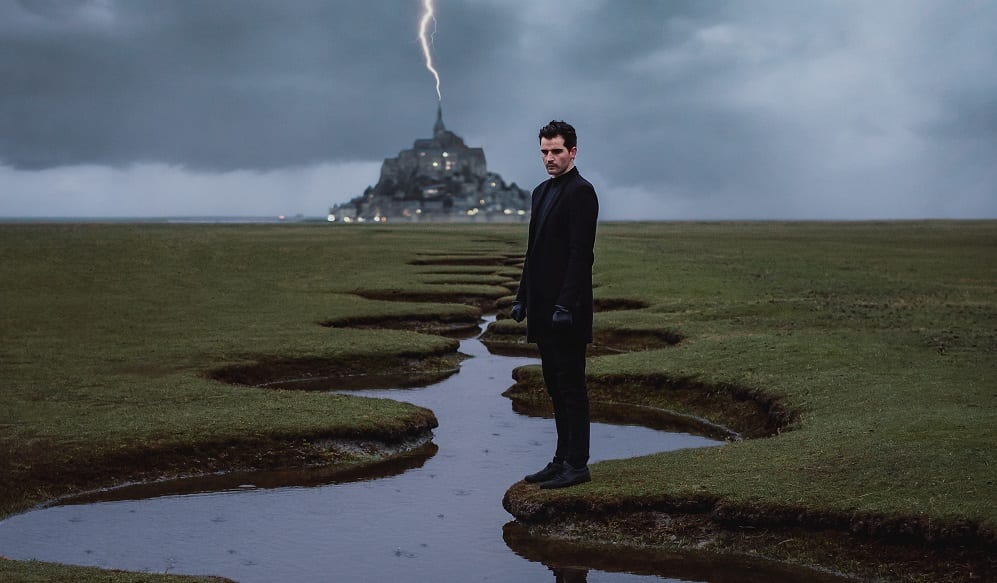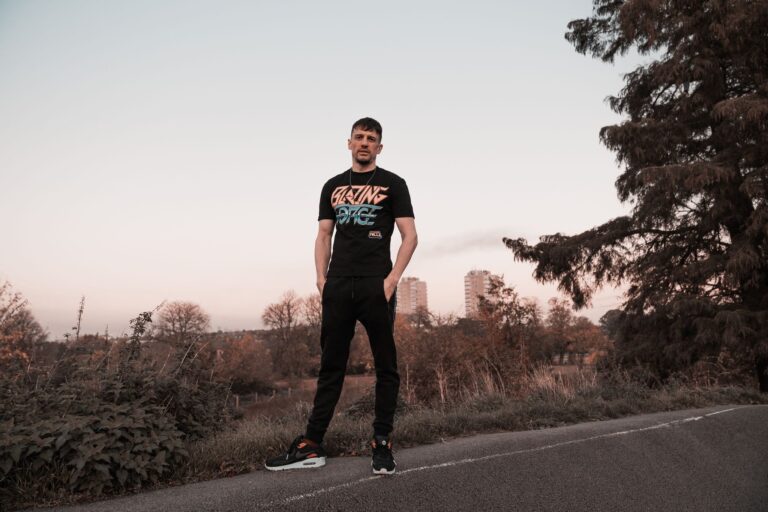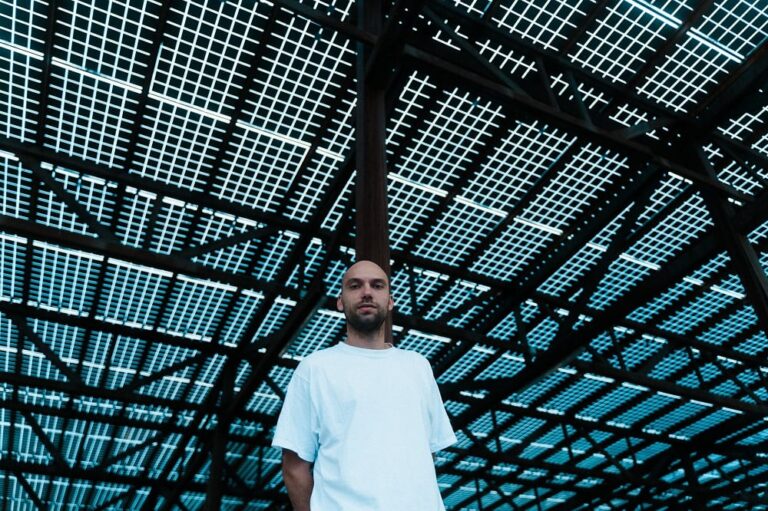Certified silver records, global streams amassing way into the millions, immersive live performances and sold out shows from Auckland to Los Angeles, the achievement list of Robert Etheridge aka Dimension is seemingly endless. He’s certainly not finished, however, as he’s announced that his much-anticipated debut album is on the way.
The album is called Organ; a unique glimpse into the sonic aesthetic that the half-British, half-Spanish artist has been cultivating in recent times. After years of singles that have instantly become crowd favourites, Dimension feels now is time to delve deeper into his musical psyche and create a tangible body of work that truly represents him, both as an artist and as a person.
Powered by an effortless musicality and clear vision, the artist has been at the forefront of the drum and bass scene since he burst onto it back in 2012. Balancing a knack for making airwave conquering, vocal-led anthems as well as moodier dance-floor creations, he found worldwide acclaim in his collaboration with Sub Focus on Desire. The track’s achievements were staggering, garnering support from worldwide radio and registering official accreditation as one of the most successful drum and bass tracks in the modern era.
He’s also responsible for helping take the genre to new audiences as part of Worship Artists, a collective that includes the likes of Sub Focus, Culture Shock and 1991. Together, they are bringing their combined platforms, artistic distinction and innovative approaches to solidify the appeal of drum and bass across North America, with their sold-out tour at the start of 2020 taking them to key cities such as Los Angeles, New York, Denver and Toronto.
Last year he also brought us DIMENSION LIVE, a multi-sensory show that truly expressed the creative capabilities he possesses. Recognising how art is a narrative that drives escapism, he’s teased three singles from the forthcoming album with accompanying videos, demonstrating a clear, conceptual vision that further adds to the mystique that surrounds him.
All these experiences have led to this moment; the time when he’s ready to show the world his first full-length body of work. We were very pleased to sit down with him to chat all about the forthcoming album…
So, debut album all finished off. How are you feeling about it all?
I’m feeling really good. I was quite apprehensive because when I normally finish off a project, there is a tendency to feel quite unsatisfied. When we worked on the live show for example, there was a huge amount of time dedicated to creating something unique and special, the event takes place, and then the day after, that’s it, it’s done. The nature of events means there’s nothing tangible, just a memory, but this feels so much more satisfying to know that there’s a body of work that will be there forever.
Is it a bit of a relief, a weight off your shoulders?
Yeah it is. It was an insane amount of work, a huge number of hours put in and constant late nights at the studio. I cried. I suppose there’s a subtle element of pride as well, knowing that I mixed, mastered, and produced everything. I’ve got it all done.
When did the plans for the album start to take shape?
I’ve always been somewhat fascinated and intimidated by the thought of creating an album, in equal measures. I was slightly conflicted by the modern-day ideology which suggests whether an album still has a purpose. People often talk about whether an album is even necessary when an artist can be successful by simply focusing on releasing singles. In the end, the reason I decided to commit to the album project was because I think I’ve become more self-assured, and in-turn become confident in the artist that I am. I wanted to do something that develops a deeper look into my sound – and also – create a musical timestamp of who I am as both an artist and a person. As an artist, I’ve learnt you don’t have to be shy with how you express yourself, and an album really allows you the creative freedom to show this. Just because it’s drum and bass, you can still write about your emotions as a form of expression, and if anyone thinks that’s not ‘cool’ or ‘underground’, I say; grow up.
Has the lockdown allowed you the time to get in the studio and just focus on cultivating the vision for the album, away from your tour schedule?
Let me tell you something, my plan was to write and finish the album through 2020 combined with my touring schedule, but honestly, I was completely deluded. There was no way in a million years I would have been able to do it – even with a clear diary it’s been a struggle. This year has been a bit of a blessing and a curse in that sense – being able to play new music at shows is, without a doubt, the best way of knowing what people think of your music. It’s unbiased and raw – an instant A&R session – you can play the song, look at the crowd and gauge their reaction. Being robbed of that has certainly made the writing process more challenging as you have to rely more on your gut instinct. With that in mind, however, having the freedom and time to truly focus on crafting the album has been really good – looking at your calendar to discover an abyss of unfilled days certainly aids creativity. There was a point in September where borders opened in certain territories and I jumped at the chance to play at some low capacity shows as it gave me the chance to test the songs in a club environment. If I do another album, I’ll certainly make sure I take at least six months off to finish it though.
You’ve teased three singles from the album so far with accompanying videos. Has the visual aesthetic always been important for you as something to support the music?
Perception is everything. If you view art through a certain lens, it completely changes the way you perceive it. It’s not dissimilar to how the brain experiences happiness. It’s so important to create a story, a narrative, an escapist dream to take people away. For me, I actually think it’s just as important as the music. There are so many musicians who aren’t necessarily as talented as others, but they have an amazing eye.
I suppose this actually extends further than just a visual aesthetic. Your live show was completely multi-sensory- sight, sound, smell…
Precisely. I always try really hard to satisfy, which might sound like a strange thing to say. But if I hear a song or go to a live show, I don’t want anyone pretentiously noodling away, I want it to be a raw, completely unadulterated and fucking bang your sense to pieces. It’s entertainment, you know? We wanted the live show to just be an incredible experience for fans within the constraints we had, drawing from influences far outside of drum and bass – Anthony Vaccerallo’s seasonal shows, for example. It was an amazing project which was really quite incredible to put together – rest assured we’re going to do it bigger and better as soon as we can get into Printworks.
How would you define the sound on the album?
Dimension.
I suppose you’ve never wanted to be pigeon-holed with your music. A lot of what you do is obviously vocal-led, but you’re not afraid to explore the darker sound as well…
Absolutely, I love songwriting. I love the musical elements; I love the writing of song lyrics. I write all of my vocals, usually in my studio in collaboration with the featured vocalist, which means that there’s a consistent thread that runs through my music even when the singer changes, so it still sounds like it’s from the same artist. I also love – sometimes prefer – making music that is quite literally crafted to raise certain emotions to fit a club environment with big, eery and purposeful aesthetics.
I really enjoy trying to draw from historical or ‘world’ sound palettes, because I believe that from a young age our brains are hardwired to link certain sounds to very a particular release of hormones – for example, a church choir or organ will fill you with a feeling that is beyond the realm of humanity, or a communist tyrant screaming will create an instant feeling of oppression. Who said art has to be pleasant? It’s all about making the club an interesting place to be.
Tell us a little more about your writing process when it comes to working with the incredible vocalists you have on the album…
The way it normally works is that I’ll have an idea in my head and make an instrumental and then write vocals that fit. Generally, I find this works better than trying to reverse engineer a song to fit a vocal. There’s a song on the album that probably took 23 different vocal sessions just to get right. Vocals are so, so, so important and the difference between a good one and an average one is small. The devil is in the detail, tone, micro hooks, turns-of-phrase, diction etc.
The way I find vocalists is usually a collaborative effort with Seb, my manager, who is also my best friend. This works well because we can be brutally – and I mean brutally – honest with each other in everything we do. There are no huge household names on the album, which keeps it focused on the music, but there’s so much talent out there that goes untapped and I love working with these people. I really try to use vocalists that haven’t been used before – certainly in drum and bass – because it’s exciting to hear new voices.
Are there any production collaborations?
Desire and Love to Give with Culture Shock are both on the album, but for the most part, I really wanted it to create something that was just from myself. In the future, I’d definitely love to get back in the studio and collaborate with other people because it’s so eye-opening and so much good music can come from it. For example, with Desire, both Nick (Sub Focus) and myself would agree that the song would have sounded wildly different if we had both worked on it individually. If you look around the scene, more and more people are collaborating; we’ve just seen Camo & Krooked and Mefjus come together for an incredible body of work, Sub Focus & Wilkinson with Portals – it’s great to see.
How is the relationship between the Worship artists?
It’s quite funny really. I remember watching Sub Focus, years ago at a festival and I was pretty much gawping at him thinking ‘If I could ever reach that level then my life would be a success.’ I’m now in this ridiculous situation where our collaboration went silver, I’m in Chase & Status’ old studio, Nick’s studio is above mine, and so is Culture Shock’s.
We hang out and go for lunch and just get on really well. Fred (1991) isn’t in the same production complex but we’re always on tour together – like when we went to North America. It was such an amazing experience out there, there was such an infectious enthusiasm for the shows. There were tales of when we were in LA, they hadn’t seen queues like that for years, and in Vancouver they were breaking records behind the bar. It felt truly special as we were all genuinely there as friends, with no real expectations, having fun and getting to enjoy it together. I think that translates not only in your performance, but to the energy of the crowd as well. I really respect Seb for doing what he’s done with Worship. At the start, he had amazing offers on his plate, but he stuck true to what he loves and it’s really starting to show. People say Worship is a label (it isn’t) or that it’s a management company (it is) but really it’s much more than that. It’s a group of musicians who like the same things and make fucking huge bangers.
As a collective who share a similar style of music, how do you find balancing making music that’s accessible to the airwaves but still retaining an underground edge?
That’s a really good question. I think when it comes down to making music, it’s about not thinking about it too much. There’s such a fine line because if your music sounds too procured for radio, then people can distance themselves. The best answer I can give to that question is that as long as it sounds real and authentic and comes from a place of love and passion, it can be accessible to airwaves and the underground. Authenticity has an unexplainable way of translating over to the listener – you can hear the bullshit.
If we look back briefly, right back to your beginnings. Have you come from a classical background? You recently posted the video of how you made Remedy and you were playing bass and keys…
When I was younger, I was begrudgingly forced to have piano lessons. I hated being told to play stuff that I had no interest in – it was a chore. I started teaching myself to play songs that – without realising – were well beyond the pale of my ability. With that said, I learnt how to play them perfectly because I cared. This was enlightening for somebody who wasn’t the best pupil. Eventually, I discovered FruityLoops when I was in Spain and realised you don’t need to be an incredible pianist to make music. You can start on a melody and draw in different notes to improve it, craft the drums etc. You 100% don’t need to be a classically trained musician to make good music, you just need a good ear and taste.
What drew you to drum and bass then? Who were your early influences?
The first thing that really got me into it was Hold Your Colour by Pendulum. After that it was anything Hospital Records were doing in the mid-noughties, that’s probably why my sound is a bit more musical. There’s something so satisfying about the quantised nature of drum and bass. I suppose if I was going to pick out some artists it would be the likes of Logistics, Netsky, Sub Focus but really – so many more. Ram was really flying at that time and Chase and Status were – and still are – smashing it.
You clearly have an appreciation for the history of the genre and rave culture, something that’s evident in tracks such as UK and Raver for example…
Thank you. It’s definitely important to honour the heritage, but I also find making those kinds of tunes really fun. There are so many sounds that you associate with early drum and bass that can transport you straight back to ’95, even if you weren’t alive then. This is another good example of how certain sounds can instantly take you to a definitive era of time or procure certain emotions. When I make a song, I always try to create a little world within it. Even if it’s a heavy, underground beat, it still needs to be full of charisma and personality; I don’t like music which doesn’t have an identity or is forgettable. Something in there needs to catch your ear – something that sticks in the memory.
Pick out some career highlights to date…
The first would be when Wilkinson decided to take me seriously. He taught me so much about the industry, teaching me things that I still put into practice to this day. He also really helped me with my early sound when I was at Cyantific Records. When Chase & Status got in touch, I think that really changed my life. To know Will and Saul had my back and were willing to put their stamp of credibility on me was really special. Desire is something else which was completely unexpected. As a song it completely ran away – an unstoppable force. The live show was the first time I truly felt like a genuine music artist. I absolutely love DJing, but it was so satisfying creating a performance that encapsulated everything I wanted to show, both sonically and from a sensory standpoint. Now with the album coming, I can’t wait for people to hear it and hopefully it will become another highlight.
I’ve spoken with a lot of people across the scene about this, so I’m interested to hear your perspective on it as well… What does the future of drum and bass look like, especially after the pandemic?
The future of drum and bass is very good. It wrongly doesn’t receive as much media coverage as other genres such as house or techno, but it stands proudly amongst them; we have Rampage and techno has Timewarp. Show me the other genres with headline artists regularly selling out Brixton Academy, Alexandra Palace or O2 Academy. It’s an incredible community that stands toe-to-toe in ticket sales with other genres in many parts of the world. People aren’t into drum and bass because it’s ‘cool’, which procures an incredibly passionate fanbase. They love the music, they’re proud of its authenticity and its heritage. The first time you hear drum and bass is just insane, it’s like being invited to a secret cult, and once you’re there, you’re hooked, and it never leaves you.
One thing we do know for certain is we’ll have your album. To finish, can you tell us when we’ll be able to get our hands on the finished product?
March 2021. Then Printworks as soon as we can.
Dimension – Organ is out March 2021. Pre-order now.
Follow Dimension: Facebook / Soundcloud / Instagram / Twitter


